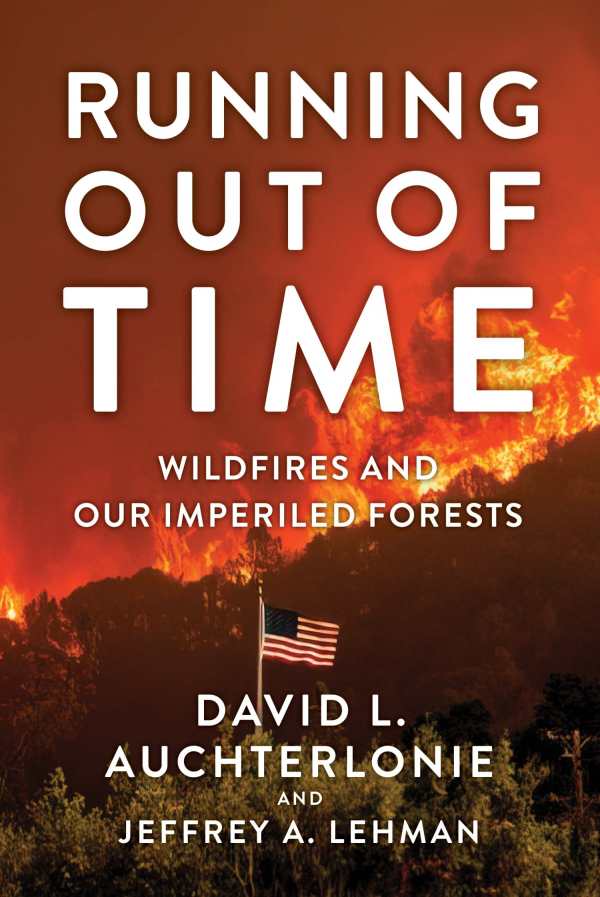Running Out of Time
Wildfires and Our Imperiled Forests
Running Out of Time forwards a compelling, targeted set of intricate recommendations for improving wildfire readiness.
Placing contemporary forest management and wildfire response practices under a microscope, David L. Auchterlonie and Jeffrey A. Lehman’s vital book Running Out of Time argues for reimagining the system.
Wildfires are an increasingly destructive fact of life in large swaths of the US—a looming danger that accompanies hotter, drier, and longer summers. Presenting stark facts—from the enormous yearly carbon emission of wildfires to the staggering costs of their destruction—Auchterlonie and Lehman make it clear that the present situation is untenable. Still, though global temperatures promise an even drier, more fire-prone future, Running Out of Time asserts that a surge in wildfires is not inevitable. It argues that most wildfires are preventable and places much of the blame for the record-breaking fires of the past two decades on an incompetent bureaucratic system that failed to create or fund a meaningful system for protecting the nation’s precious natural resources.
With backgrounds in financial strategy and corporate crisis management rather than forestry, Auchterlonie and Lehman approach the problem of wildfires as seasoned business executives, with a focus on efficiency, efficacy, and statistics. Their book is an encyclopedic compilation of the data on forests, fires, and the government systems that are supposed to mitigate wildfires. Divided into clear, effective chapters that cover the expenses of wildfire prevention, the costs of wildfire damage, and the various merits of different response protocols and firefighting equipment, this book serves equally well as an academic tool for learning about the phenomenon of wildfire and as a targeted set of think-tank-style recommendations for improving wildfire readiness and stopping the blazes from starting. Graphs, chapter summaries, and an extensive bibliography make even the most arcane sections of this book accessible.
While the book is short on narrative flow, its depth of research and powerful logic makes it compelling. The authors’ lack of forestry expertise ends up being useful: it permits them to articulate obvious yet essential questions and arrive at promising, data-driven answers. After observing that lighting causes 65 percent of all wildfires in the fifteen most wildfire-prone states, they recommend a prevention system that would coordinate firefighting equipment with weather predictions. In this way, they suggest, response teams would be prepared and in place whenever lightning is expected to hit a fire-prone area. Like many of their other other recommendations, this requires government agencies to make simple, effective use of technologies already in their possession.
The most frustrating facts emerge in an analysis of the tens of overlapping government organizations that compete to manage public land. The analysis is succinct in demonstrating the perils of systems that are too bureaucratic—and in suggesting that a more organized, top-down structure would be beneficial. In this and other instances, the recommendations favor private, market-based solutions, but there is nothing ideological or partisan in these analyses. Alongside capitalist, incentive-driven changes, the book draws attention to traditional land practices and extols the benefits of returning land stewardship to Native American tribes. The final result is a clear-eyed perspective on how to approach one of the most dangerous problems facing the world today.
Presenting innovative solutions alongside a damning analysis of current practices, Running Out of Time is a hopeful book filled with new ideas for reinvigorating the fight against wildfires.
Reviewed by
Willem Marx
Disclosure: This article is not an endorsement, but a review. The publisher of this book provided free copies of the book and paid a small fee to have their book reviewed by a professional reviewer. Foreword Reviews and Clarion Reviews make no guarantee that the publisher will receive a positive review. Foreword Magazine, Inc. is disclosing this in accordance with the Federal Trade Commission’s 16 CFR, Part 255.

